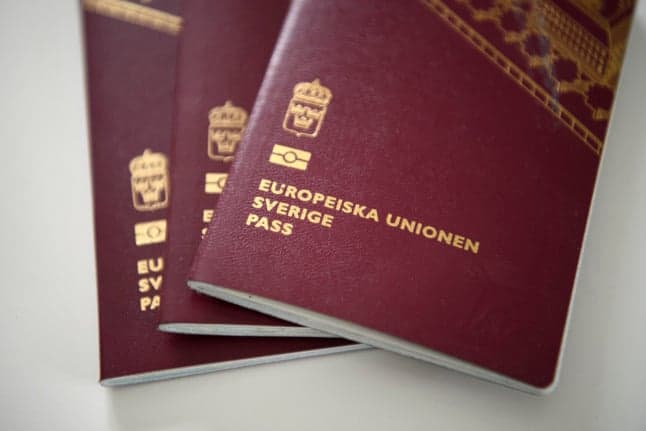IN NUMBERS: How many people became Swedish citizens in 2021?

Processing applications for Swedish citizenship is still the Swedish Migration Agency's biggest job. But how many people became Swedish citizens last year, and how does that compare to previous years?
In 2021, just over 76,000 citizenship applications were received by the Migration Agency, and 71,229 (not necessarily all from 2021) were approved. This is a decrease from 2020, when a total of 67,331 citizenship applications were approved. These figures do not include children who were granted Swedish citizenship alongside a parent, as children do not apply for citizenship directly.
Of those who became Swedish citizens in 2021 (including children receiving citizenship alongside a parent), 44 percent came from Syria (31,388). The next most common countries of origin for applicants were Somalia (5,011), Afghanistan (4,612), Eritrea (3,923), Iraq (2,459), Poland (2,174), India (1,676), Thailand (1,647), Germany (1,378), Iran (1,338), the UK (1,188) and Turkey (1,071).
In total, 86,889 citizenship applications were approved last year, including children as well as people whose application was rejected by the Migration Agency but approved by an appeals court.
Long waits for citizenship have been a hot topic of debate in Sweden in recent years. According to the Migration Agency's website, 75 percent of "recently closed cases" received a decision on their application within 21 months.
In November 2021, Sweden had a population of 10,449,381, according to Statistics Sweden, meaning 2021's new Swedish citizens represent less than one percent of the population.
EXPLAINED:
In addition to citizenship applications, the Migration Agency received 12,625 applications from Brits applying for residence status before the deadline of December 31st 2021. Of these, 8,231 had been granted residence status at the end of 2021, with more still waiting to hear back.
More work permits were issued in 2021 than 2020, increasing from 32,379 to 39,270. The most common country of origin for those who were granted a work permit was Thailand, followed by India and Ukraine. The majority of work permits were issued for berry pickers and planters, as well as IT-related jobs. In addition to this, 25,842 work permits were extended in 2021.
In total, the majority of residence permits issued were work permits, followed by family connections (anknytning), with 24,189 individuals in the latter group receiving a residence permit.
Students were the next big group, with 14,034 study permits issued in 2021.
The next group of permits issued were for asylum seekers, with 11,443 permits of this type issued and 23,864 asylum permits extended in 2021.
Finally, 5,653 non-EU citizens were issued with residence permits as family members of an EU citizen. 898 of this type of permit were extended.
Note that these figures do not include EU citizens working, studying or supporting themselves, as they are not usually issued with residence permits.
Comments (1)
See Also
In 2021, just over 76,000 citizenship applications were received by the Migration Agency, and 71,229 (not necessarily all from 2021) were approved. This is a decrease from 2020, when a total of 67,331 citizenship applications were approved. These figures do not include children who were granted Swedish citizenship alongside a parent, as children do not apply for citizenship directly.
Of those who became Swedish citizens in 2021 (including children receiving citizenship alongside a parent), 44 percent came from Syria (31,388). The next most common countries of origin for applicants were Somalia (5,011), Afghanistan (4,612), Eritrea (3,923), Iraq (2,459), Poland (2,174), India (1,676), Thailand (1,647), Germany (1,378), Iran (1,338), the UK (1,188) and Turkey (1,071).
In total, 86,889 citizenship applications were approved last year, including children as well as people whose application was rejected by the Migration Agency but approved by an appeals court.
Long waits for citizenship have been a hot topic of debate in Sweden in recent years. According to the Migration Agency's website, 75 percent of "recently closed cases" received a decision on their application within 21 months.
In November 2021, Sweden had a population of 10,449,381, according to Statistics Sweden, meaning 2021's new Swedish citizens represent less than one percent of the population.
EXPLAINED:
In addition to citizenship applications, the Migration Agency received 12,625 applications from Brits applying for residence status before the deadline of December 31st 2021. Of these, 8,231 had been granted residence status at the end of 2021, with more still waiting to hear back.
More work permits were issued in 2021 than 2020, increasing from 32,379 to 39,270. The most common country of origin for those who were granted a work permit was Thailand, followed by India and Ukraine. The majority of work permits were issued for berry pickers and planters, as well as IT-related jobs. In addition to this, 25,842 work permits were extended in 2021.
In total, the majority of residence permits issued were work permits, followed by family connections (anknytning), with 24,189 individuals in the latter group receiving a residence permit.
Students were the next big group, with 14,034 study permits issued in 2021.
The next group of permits issued were for asylum seekers, with 11,443 permits of this type issued and 23,864 asylum permits extended in 2021.
Finally, 5,653 non-EU citizens were issued with residence permits as family members of an EU citizen. 898 of this type of permit were extended.
Note that these figures do not include EU citizens working, studying or supporting themselves, as they are not usually issued with residence permits.
Join the conversation in our comments section below. Share your own views and experience and if you have a question or suggestion for our journalists then email us at [email protected].
Please keep comments civil, constructive and on topic – and make sure to read our terms of use before getting involved.
Please log in here to leave a comment.